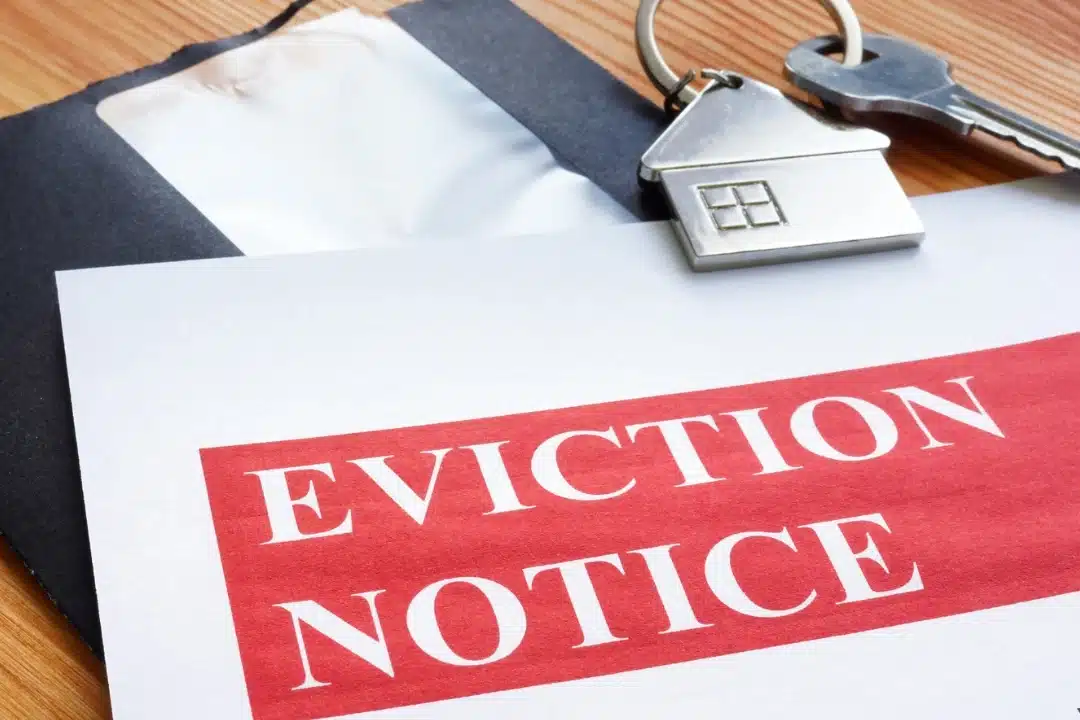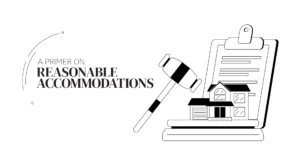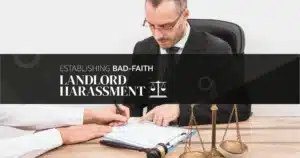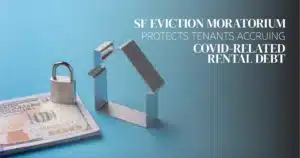One day, Sarah came back home and saw an eviction notice taped to her door. Her heart began to race, and she thought to herself, “Can the landlord really do this to me? Don’t I have any rights?”
The truth is, under California law, she does have many rights and legal protections, but no one told her about them. This is the painful reality that many renters face. Tenants are protected from being forced out of their homes without proper notice or a fair legal process, yet it still happens far too often.
So, what can you do?
Every tenant must know what their legal rights are and how the eviction process should go. This knowledge protects them from unfair treatment. If they are being treated unfairly, they have the right to fight back and defend their home.
Let’s take a look.
What Is the Legal Eviction Process
Eviction is one of the most stressful things you can go through as a tenant. If it’s sprung on you without warning, it can be downright overwhelming.
When done legally, the eviction process follows a specific procedure; landlords cannot simply throw someone out.
Here’s how it goes:
Notice to Vacate
The first step a landlord must take is to issue a notice to vacate (or notice to quit). This notice explains the reason for eviction, which can include non-payment of rent, lease violations, or other valid causes. The landlord must also give the tenant a specific number of days to respond or move out.
Filing an Eviction Lawsuit
If the tenant doesn’t leave after the notice period expires, the landlord cannot just change the locks or remove their belongings. They must file an eviction case in court, known as an unlawful detainer.
Court Hearing
The tenant must appear in court after receiving a summons and has the right to explain their side of the story. The judge hears both sides and decides whether the eviction is valid.
Judgment & Removal
If the case is settled in favor of the landlord, the sheriff or law enforcement can carry out the eviction. The landlord is not authorized to change the locks or remove the tenant’s belongings on their own.
If the case is settled in favor of the tenant, the tenant may continue living in the property.
Your Core Tenant Rights During the Eviction Process
Even if the eviction is legal, the landlord must respect the tenant’s rights throughout the process. Here’s how tenants can make sure those rights are protected:
Right to Proper Written Notice
Tenants have the right to receive a written eviction notice from their landlord. This notice must include the reason for eviction, giving tenants a chance to respond or correct the issue. If no valid notice is provided or it’s not properly filed with the court, the eviction may be invalid — and the tenant has the right to challenge it.
Right to Remain in the Unit Until a Court Order Is Issued
Tenants have the right to stay in their home until a court order is officially issued. During this period, the landlord cannot force them out, shut off utilities, or remove their belongings.
Right to Challenge a Wrongful Eviction in Court
Tenants can challenge an eviction in court if they believe it’s unfair. This includes cases where the eviction is in retaliation for reporting unsafe conditions or requesting repairs. If the tenant can prove retaliation, they may be able to stop the eviction.
Right to Safe and Habitable Living Conditions
Tenants have the right to live in a safe and habitable home. This means the landlord must not neglect repairs, cut off utilities, or make the property unlivable in an attempt to force tenants out. These actions violate housing and health codes and can be reported.
How a Tenant Rights Lawyer Can Help
Facing eviction is stressful enough; you don’t deserve unfair treatment on top of it. That’s where tenant eviction lawyers come in. They help you understand and protect your housing rights.
Here’s what you can expect from an experienced tenant rights attorney:
A tenant rights lawyer will review your eviction notice and lease to ensure your landlord followed proper legal procedures. They can identify any violations and help you challenge the eviction in court.
They can negotiate with your landlord to reach a fair settlement — whether that means reducing your rent, giving you more time to move, or dismissing the case entirely.
They can represent you in court and present your case before the judge.
Most importantly, they help prevent illegal evictions, ensuring your landlord cannot lock you out, cut utilities, or remove you without a valid court order.
Standing Up for Your Rights
At The Law Firm for Tenant Rights, we understand how difficult it can be for tenants to find and keep a safe, comfortable home. Too many renters lose their housing simply because they don’t know the legal protections available to them.
We make sure your landlord follows the law, and we step in when you’re being harassed or treated unfairly.
Contact us today to learn more about your rights and schedule a free consultation.
Frequently Asked Questions
-
Can my landlord evict me without notice?
No. In California, landlords must provide written notice before filing for eviction, usually 3, 30, 60, depending on the reason.
-
What is an unlawful detainer?
An unlawful detainer is the legal term for an eviction lawsuit that a landlord must file in court before removing a tenant.
-
Can my landlord shut off utilities to make me leave?
No. Cutting off water, electricity, or gas to force a tenant out is considered an illegal eviction tactic.
-
Do I have to move out right after receiving an eviction notice?
Not immediately. You have the right to stay in your home until a court order is issued following a legal eviction process.
-
What can I do if I believe the eviction is unfair or retaliatory?
You can challenge the eviction in court and present evidence that your landlord is retaliating or acting in bad faith.
-
Can a landlord evict me for reporting unsafe living conditions?
No. Retaliatory evictions are illegal; tenants cannot be evicted for exercising their right to a safe and habitable home.
-
How long does the eviction process usually take in California?
It typically takes anywhere from 30 to 90 days, depending on the type of notice, court schedules, and whether the tenant contests the eviction.
-
What happens if I win my eviction case?
If the court rules in your favor, you can stay in your home, and your landlord may be required to fix any violations or damages.
-
Do I need a lawyer to fight an eviction?
While it’s not mandatory, having a tenant rights attorney can greatly increase your chances of success and ensure your rights are protected.
-
How can The Law Firm for Tenant Rights help me?
They provide legal representation, help you challenge unfair evictions, negotiate settlements, and ensure landlords follow all California housing laws.





